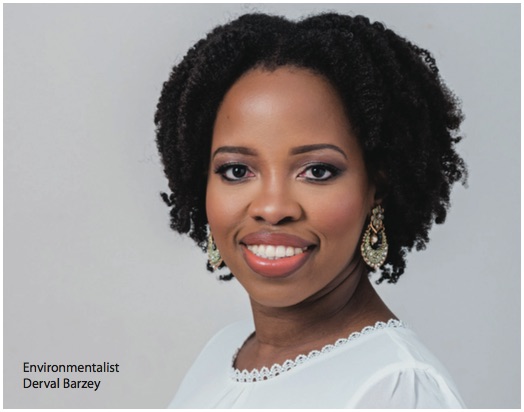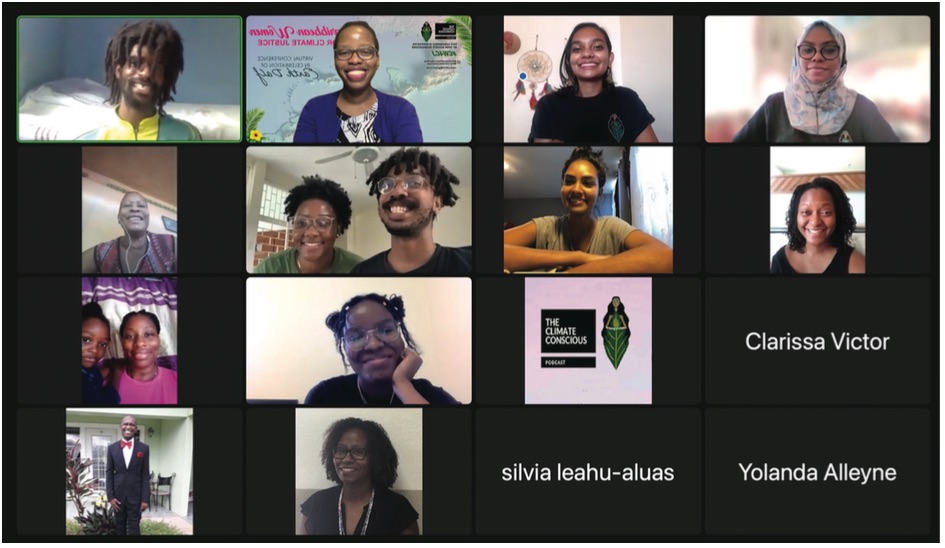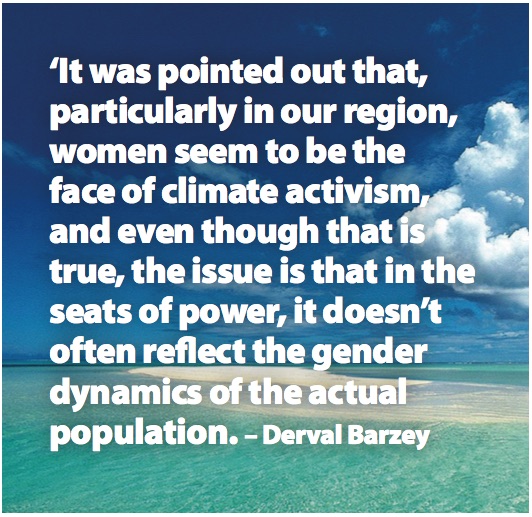Working in the energy sector was somewhat of a wake-up call for environmentalist Derval Barzey. She had a lifelong interest in the environment, but her position at an oil and gas company in environmental risk management put more into perspective. There, she saw firsthand how energy impacted the environment and, moreover, how climate change was a multifaceted issue – one such facet was the lack of Caribbean voices in climate advocacy.

“It’s not just a climate crisis – it’s a health crisis. It’s an economic crisis. I wanted to help people who would listen make that connection,” said Barzey speaking of her podcast, The Climate Conscious. “Although climate change is a global issue, the conversations are being dominated now by what we refer to as the Global North or developed nations. The flip side to that is me being from the Caribbean and observing the impacts of climate change and acknowledging that our region is classed as one of the most, if not the most, vulnerable regions for climate change. If persons are not really involved in the environmental or sustainability space, they’re basically going about their lives trying to survive and put food on the table, and not really making the connection between their lives, their livelihood, and the climate crisis.”

The Climate Conscious is focused on discussing advocacy around climate change and environmental sustainability, specifically in the Caribbean and Small Island Developing States (SIDS). Started in 2020, the podcast has been quite successful in its two-year existence. Listed as one of the top sustainability podcasts in 2021 by University College London, Climate Conscious has 41 episodes and 4,550 downloads thus far with listeners in 106 countries. The podcast was also the foundation for the recently held “Caribbean Women for Climate Justice Conference” organised by Barzey in conjunction with Guyanese NGO, The Breadfruit Collective.
All of these projects are a culmination of years of studying the environment and acknowledging the need for regional action on climate change. Barzey is an alumna of both The UWI St Augustine and the Arthur Lok Jack Graduate School of Business (now known as the Arthur Lok Jack Global School of Business), where she obtained a BSc in Environmental and Natural Resource Management and an MBA in Sustainable Energy Management. She noted that her time at The UWI was pivotal in her transition from interest in the environment, to career, to then the passion project of her podcast.
“UWI sowed the seeds of it. The programme gave me broad exposure to environment and natural resource management, but also looking at natural ecosystems and getting an understanding of the biodiversity that exists in our space. One fascinating thing for me was looking at seawater under the microscope and discovering all the organisms that exist in a drop of seawater. It helped me to understand how vast our environment is beyond what we can see with the natural eye, and go deeper into my appreciation of the environment.
“There’s a lot going on in the region, but because of our geographic fragmentation, we haven’t really figured out regional integration fully yet. So, I could be doing something in T&T and somebody doing something similar in Jamaica, but we’re unaware of each other. If we were able to partner or collaborate, we could be able to share resources and ideas, and the results could be much more effective,” she said.
According to Barzey, there’s a need for integrated action in the Caribbean that goes beyond signing international agreements. “For us as SIDS, we have similar lived experiences when it comes to the climate crisis, and coming together would allow us to make stronger representation for ourselves as opposed to going alone. There’s a saying that we are stronger together, and that’s definitely true because we’re coming up against more powerful nations and are demanding that they act responsibly. Another side of it would be our shared history of colonisation and exploitation which came out as being the root of the climate and gender injustice issue. There’s more that brings us together than separates us, and for us to be effective in what we accomplish, we need to partner,” added Barzey.
Part of her purpose for both the podcast and conference was also highlighting the need for more female voices, not only in activist circles, but as top environmental decision makers. “It was pointed out that, particularly in our region, women seem to be the face of climate activism, and even though that is true, the issue is that in the seats of power, it doesn’t often reflect the gender dynamics of the actual population. So, when we talk about climate and gender justice, it’s about ensuring that whatever decisions are being made, the perspectives, experiences and concerns of women are accounted for. Whereas we have a lot of women involved in activism, we also need a lot of women to be involved in decision-making and planning to ensure that our needs are catered to,” noted Barzey.

As such, Caribbean Women for Climate Justice made the intersectionality of gender and climate change their main theme. Held virtually from April 21-24, 2022, the conference was made possible by a grant from the Open Society Foundation. There were 27 panellists and 250 registrants from 21 countries. They discussed human rights, climate resilience and gender equality, and included not only panel discussions, but also film screenings, storytelling for children and a wellness session. One of the 34 conference community co-sponsors was the UWI Institute for Gender and Development Studies (IGDS) IGNITE. One of the outcomes from the conference is the creation of a database of regional environmental stakeholders. The database will be made accessible to the public through a partnership with the Caribbean Natural Resources Institute.
The conference solidified the need for continued discussion and action on a regional level, but also made it clear that true change is required from the bottom up. “I’m happy to know that there is wide interest in the environment. I just think that we need greater engagement between the persons on the ground – because we have a lot of grassroots activism – and the seats of power.”